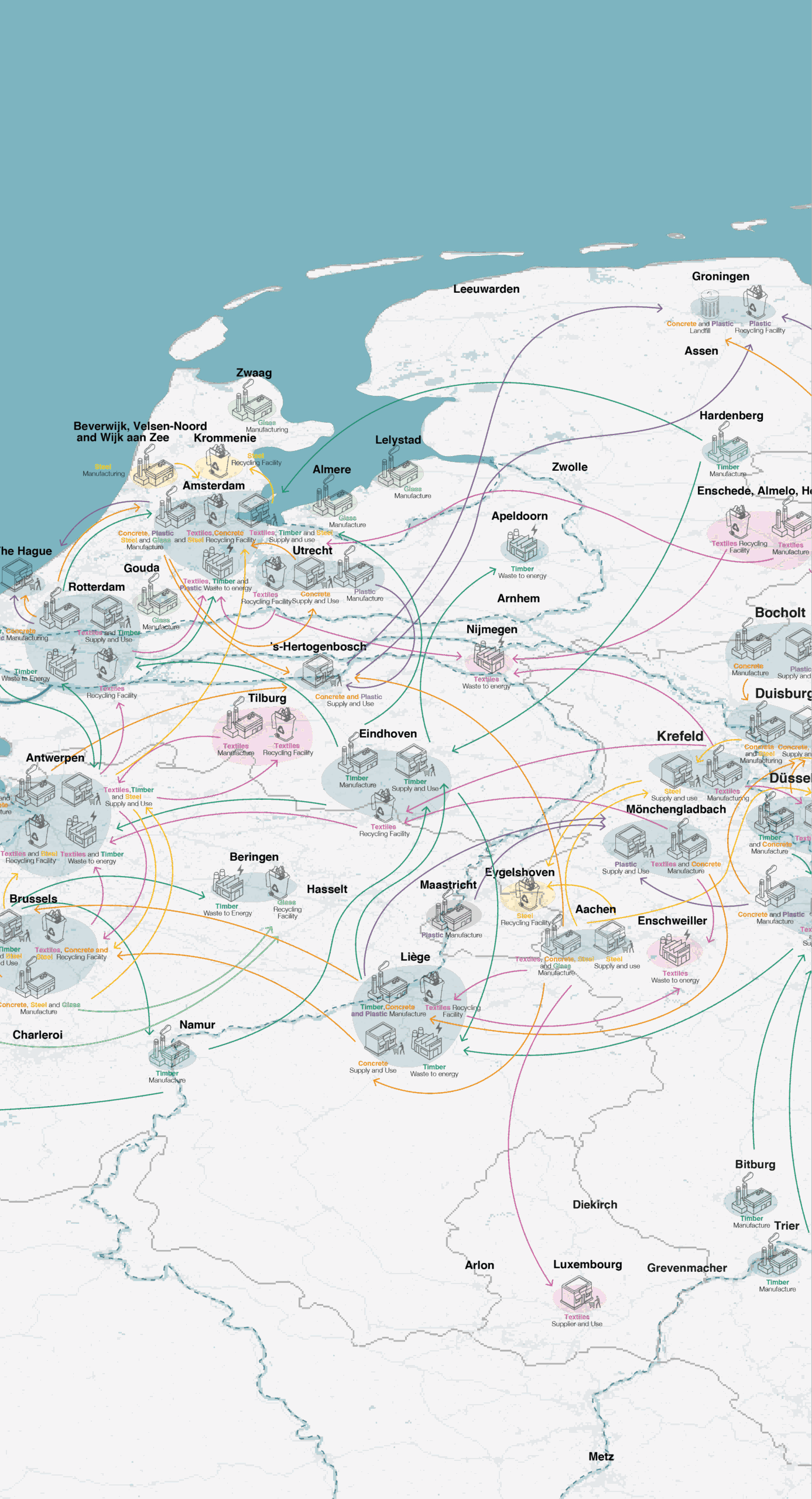Transforming City Regions for Circularity
Summer Semester 2024, Winter Semester 2024/2025
The Transforming City Regions (TCR) Master‘s programme at RWTH Aachen University (RWTH) offers an interdisciplinary, project-based approach to urban and regional planning. Designed to address the complexities of contemporary urbanisation, TCR bridges theory and practice through applied research and collaborative design. Thereby, TCR equips students not only to understand urban systems, but to actively shape their transformation. Following this rationale, within the EU-funded ASSET project, three interlinked courses and a Master’s thesis explored circularity through site visits, design studios and strategic analysis at different scales—from neighbourhoods to macro-regions. The courses were closely linked to ongoing research, enriched by expert input, and offered different perspectives on the spatial implications of a circular economy and its practical implementation in space.
Integrated Project II: Evolution of functional urban areas ‘Harbour City Amsterdam’: immersed students in Haven-Stad, Amsterdam‘s flagship urban development. With input from local stakeholders and a dedicated site visit, students developed design concepts that incorporated circular design principles into one of Europe‘s largest urban regeneration sites. Applying the Spatial Strategy for Circular South-Holland, they proposed innovative mixed-use and circular neighbourhoods with multi-functional hubs and high-quality public spaces. Early stakeholder involvement and iterative feedback were key to shaping feasible, site-specific strategies that linked spatial design with systemic change.
Research Module in urban and regional transformation ‚Eurodelta 2050+: Spatial strategies for a circular built environment’: broadened the scope by focusing on cross-border strategies for a circular built environment in the Eurodelta. Through site visits to circular companies in Brussels and Amsterdam, stakeholder interviews and scenario development, students analysed material flows and governance frameworks. Their analytical and conceptual outputs articulated empirically based visions for a Circular Eurodelta, linking spatial planning with long-term sustainability goals.
Elective course‚ Circular urban landscapes‘: paired with RWTH’s Urban Design Colloquium, explored how circularity is reshaping urban form and policy. Using case studies from Germany, Belgium, the Netherlands and Denmark, among others, students explored themes such as urban mining, adaptive reuse and behavioural change. Public dialogues with experts informed critical essays and visual narratives, highlighting the spatial, cultural and policy dimensions of the circular transition.
Master thesis ‚Crossing borders, closing loops‘: advanced the regional dimension of circularity by exploring how cross-border cooperation can drive systemic change in the Eurodelta. Through spatial analysis, stakeholder mapping and semi-structured expert interviews, it proposed frameworks for shared infrastructure, policy alignment and circular supply chains. The research highlighted that closing loops at scale requires not only technical solutions, but also governance innovations and coordinated planning.
Taken together, the following project selection demonstrate that circularity must be approached across scales and over time. Planning at the neighbourhood level, as in Haven-Stad Amsterdam, benefits from early collaboration and sustained dialogue. At the regional level, integrated spatial analysis and stakeholder narratives are essential for shaping visions such as the Circular Eurodelta 2050+. The selection highlights the importance of enablers such as multi-functional hubs and flexible zoning, while also highlighting political, economic and governance challenges. Crucially, the works show that cross-border collaboration between academia, industry and government is key to overcoming fragmented systems and realising circular potential.
Contributing students: Laura Caroline Barbosa e Silva, Cemre Bingöl, Hanna Broß, Ana Paulina Cabello, Qian Chen, Elif Ertemiz, Juliana Garcia Valencia, Elies Horemans, Jordan Lewa, Yuhan Liu, Lilian Mehlem, Justin Pauls, Carolin Schwabe, Nitisha Sai Kiran Srikurmam, Valentina Vavalà, Jia Vogel, Jana Westerkamp
Tutors: Christa Reicher, Fabio Bayro Kaiser, Lara Wittfeld
Contributors: Alexander Wandl (TU Delft), Arjan Klok (City of Amsterdam), Bart Bomas (BVR), Bas Horsting (City of Amsterdam), Christa Reicher (RWTH), Dagmar Keim (City of Amsterdam), Frenk Bekkers (PZH), Mariana F. Linhares (PZH), Pietro Fragapane (Environment.Brussels), Tanja Tsui (LEI)
Student assistants: Laura Barbosa e Silva, Elif Ertemiz
